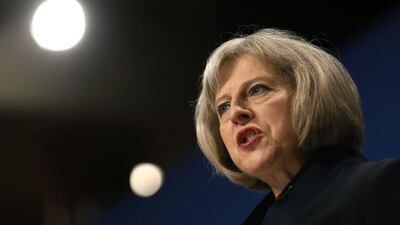Over the last couple of weeks, the international community has been looking at the best ways to tackle ISIL. Beyond the use of military force, a number of softer measures have also been designed to respond to that branch of radical Islamism. The question is: will they be successful or will they be counterproductive?
During the UK’s Conservative party conference this week, Theresa May, the home secretary, discussed these “softer” measures.
Her main focus was on non-violent radicals – those who shared certain common radical ideas with the likes of ISIL, but were not suspected of carrying out violent actions. A “hard” security response cannot be used against such groups, but the home secretary is keen to introduce legislation that would allow for a tougher response than is currently available.
There is something rather unnerving about the suggestion. The United Kingdom already has legislation that allows for a strong response to those who incite violence or engage in hate speech.
However, the Conservatives seek to introduce banning orders for extremist groups and “extremism disruption orders” for those who “spread hate but do not break existing laws”. It is unclear what that means, especially as the legal system already has laws to allow for prosecution when hate speech is involved. What then is being spoken of?
There are hints included in the fine print, where it is mentioned that the policy is meant to cover those who engage in “harmful activities” intent on “overthrowing democracy”. But that is a slippery slope.
After all, in any free and democratic society, one of the main signs of a healthy political system is dissent that ranges from the radically progressive on the one hand to the fundamentally regressive on the other. The very existence of such dissent keeps the mainstream on its toes and forces it to craft progressive policies to remain healthy.
This is not to say that all types of dissent ought to be left alone. The UK has a range of laws that criminalise certain types of hate speech and incitement, and it is important that societies take steps that reflect how dangerous certain types of speech can be.
But the UK has taken those steps already – for the Conservatives to suggest a discussion about the criminalisation of hate speech implies that something far more illiberal might be intended.
Again, this is not to say that non-violent radicalisation should not provoke a response – it should, but that response should be part of civil society’s responsibility, rather than government or the state.
In that vein, hundreds of Muslim religious figures have signed an extensive declaration against ISIL, on religious grounds.
There are, it must be admitted, certain weaknesses within the declaration’s overall effectiveness, because those sympathetic to ISIL are unlikely to be drawn away from the self-proclaimed caliphate due to this declaration.
Vulnerable individuals are already too close to ISIL’s worldview for this type of counter-narrative engagement to be effective. Moreover, without a track record of speaking out about abuses by governments around the world, and not just those of ISIL, mainstream religious authorities have a credibility gap to fill.
However, the general direction is the correct one.
The key to making that response credible is by engaging with civil society, whether in the UK or otherwise, and encouraging steps that would engage more communities.
Efforts such as these are likely to be far more effective in tackling non-violent radicalisation in countries like the UK, than the Conservative party’s suggestion to further restrict free speech.
ISIL and their non-violent enablers should not push the West to degrade the principle of free speech in our societies. Rather, these societies must use that very principle to put ISIL and their allies on the back foot – they certainly have the intellectual resources to do so.
Dr HA Hellyer is an associate fellow at the Royal United Services Institute in London and the Brookings Institution in Washington DC


